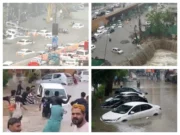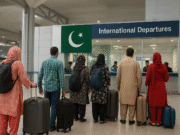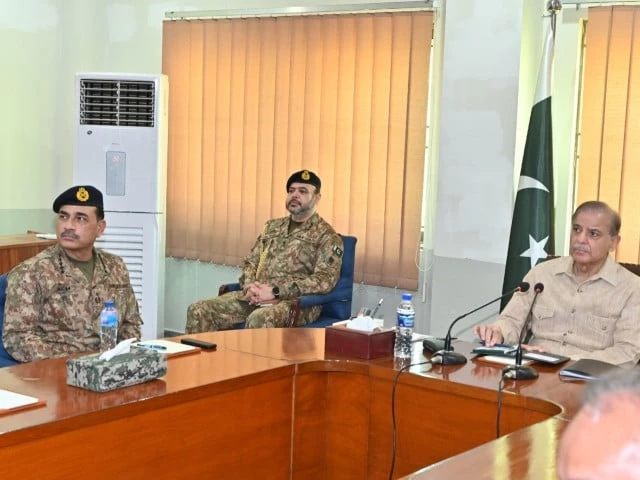Prime Minister Shehbaz Sharif and Chief of Army Staff (COAS) Field Marshal Syed Asim Munir on Wednesday toured several flood-ravaged districts of Khyber Pakhtunkhwa (KP), pledging to mobilise every available resource for relief and recovery, as the death toll from the province’s torrential rains and landslides surged beyond 385.
The premier, accompanied by federal ministers Ahsan Iqbal, Attaullah Tarar, and Amir Muqam, visited Swat, Buner and Shangla where he met survivors and distributed relief cheques. He assured families of the federal government and Pakistan Army’s “unwavering support,” while appreciating the “tireless efforts” of the armed forces, Rescue 1122, and the civil administration.
“We will not rest until normalcy is restored. Every national resource will be mobilised for relief, rehabilitation and rebuilding,” the prime minister said, according to the Press Information Department (PID).
During his visit, PM Shehbaz voiced concern over illegal encroachments, timber smuggling, and stone crushing along waterways, calling them major contributors to worsening flood damage. He recalled the devastation of the 2022 floods, stressing that Pakistan must “act as a hard state where no one is above the law” to prevent repeat tragedies.
Field Marshal Munir also addressed rescue workers in KP, commending their dedication and directing formations to “spare no effort in alleviating the hardships of flood-hit families.”
Dalori tragedy: all 37 bodies recovered
The most heart-wrenching scenes came from Dalori village in Swabi’s Gadoon Amazai belt, which was struck by a cloudburst earlier this week. Entire households were buried when 12 homes collapsed under heavy debris.
Rescue 1122 confirmed that 37 bodies have now been retrieved after a three-day round-the-clock operation involving over 100 personnel, army soldiers, civil defence volunteers, and local residents. Eight people were pulled out injured and given free medical treatment.
Swabi Deputy Commissioner Nasarullah Khan said the recovery operation had been completed and relief work was now underway. “The people cooperated fully, and we are moving towards rehabilitation efforts,” he added.
Human and material toll across KP
According to the Provincial Disaster Management Authority (PDMA), heavy rains since August 15 have claimed 385 lives in KP alone — including 299 men, 52 women, and 34 children. Another 182 people have been injured, while 1,398 homes have been damaged, 368 of them beyond repair.
Buner district remains the hardest-hit area, with 228 fatalities, followed by Swabi, which has reported 41 deaths.
Government aid and response
The KP government has pledged Rs5 billion in financial support, after approving an additional Rs2 billion this week to accelerate relief and rehabilitation. Chief Minister Ali Amin Gandapur instructed officials to reopen health centres, deploy mobile hospitals, restore water supplies and launch a sanitation drive to prevent disease outbreaks.
The federal government has also announced seven days of free electricity for affected households and ordered urgent repair of damaged roads across provincial and federal jurisdictions.
Nationwide toll and international sympathy
Since the start of the monsoon season in June, nearly 750 people have died nationwide, most of them in KP and Punjab. In Punjab alone, 165 deaths have been reported, with officials warning of a new weather system expected on August 23 that could bring more flooding.
Meanwhile, expressions of sympathy have poured in from abroad. The United Kingdom’s King Charles III extended condolences to Pakistan, saying he and Queen Camilla were “desperately saddened” by the scale of devastation.
“Our thoughts and deepest sympathy are with all those who have lost loved ones, homes and livelihoods,” the British monarch said, praising the courage of emergency workers and local communities.
A climate crisis reminder
Pakistan remains among the world’s 10 most climate-vulnerable countries. Experts warn that deforestation, unplanned construction, and unchecked development have amplified the risks of natural disasters, leaving millions exposed to extreme weather.
The memory of the 2022 floods, which submerged a third of the country and killed nearly 1,700 people, looms large as Pakistan once again grapples with a climate-induced catastrophe.








































